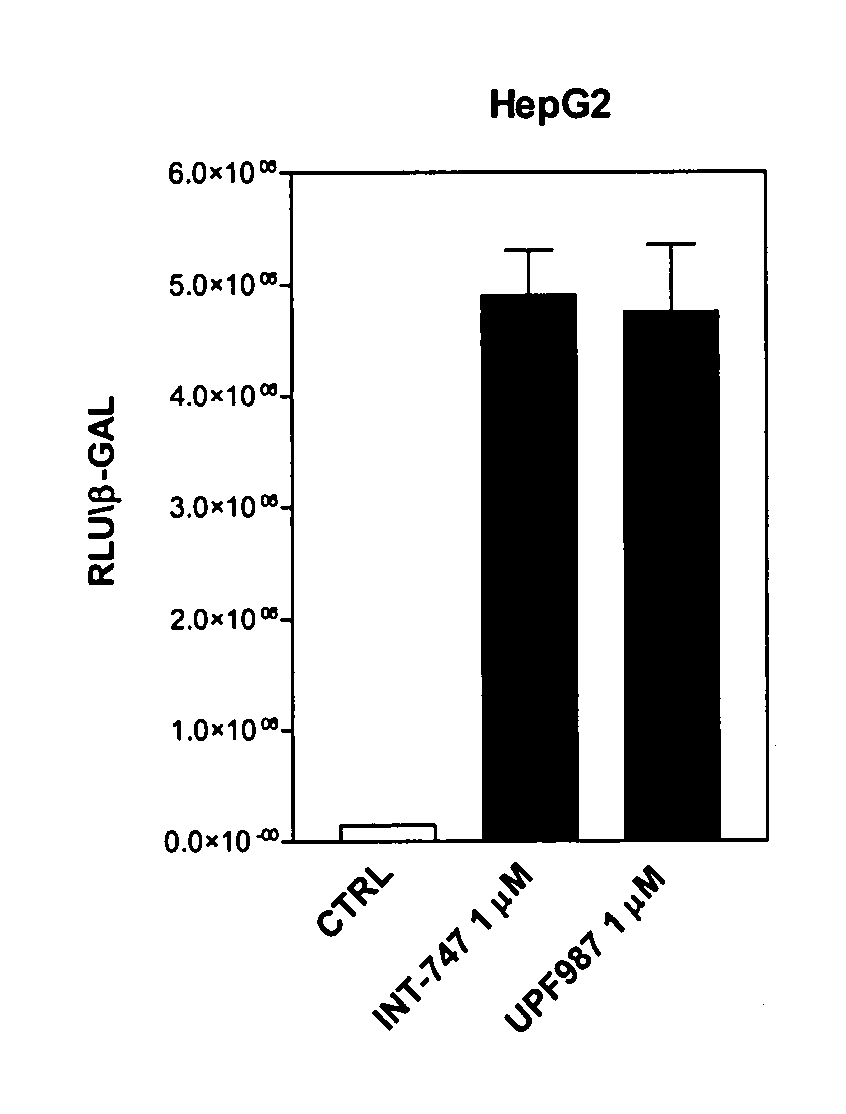Bile acid derivatives as FXR ligands for the prevention or treatment of FXR-mediated diseases or conditions
a technology fxr, which is applied in the field of bile acid derivatives, can solve the problems of failure to activate mouse and human fxr, and leave the nature of endogenous fxr ligands in doubt, and achieve the effect of preventing or treating
- Summary
- Abstract
- Description
- Claims
- Application Information
AI Technical Summary
Benefits of technology
Problems solved by technology
Method used
Image
Examples
example 1
[0100]Chemistry. Melting points were determined with a Buchi 535 electrothermal apparatus and are uncorrected. NMR spectra were obtained with a Bruker AC 200 MHz spectromer, and the chemical shifts are reported in parts per million (ppm). The abbreviations used are as follows: s, singlet; bs, broad singlet; d, doublet; dd, double doublet; m, multiplet; q, quartet, t, triplet. Flash column chromatography was performed using Merck silica gel 60 (0.040-0.063 mm). TLC was carried out on precoated TLC plates with silica gel 60 F-254 (Merck). Spots were visualized with phosphomolybdate reagent (5% solution in EtOH). The reactions were carried out under a nitrogen atmosphere.
3α-Tetrahydropyranyloxy-7-keto-5β-cholan-24-oic Acid (2)
[0101]3,4-dihydro-2H-pyrane (1.74 ml, 19 mmol) in dioxane (12 ml) was dropped slowly to a solution of p-Toluenesulfonic acid (115 mg, 0.6 ml) and 6α-ethyl-7-ketolithocholic acid (5.0 g, 12 mmol) in dioxane (55 ml). The reaction mixture was stirred at room temperat...
example 2
Biological Activities
[0124]Tests were first carried out in order to verify whether UPF-987 modulates FXR-regulated genes, in comparison with chenodeoxycholic acid (CDCA). CDCA is a primary bile acid that functions as an endogenous ligand of the farnesoid-x-receptor (FXR; NR1H4). The biological activity of UPF-987 on FXR activity was first tested in an in vitro assay using the fluorescence resonance energy transfer (FRET) cell free assay, described in Pellicciari R., et al. J Med Chem. 2002 15; 45:3569-72.
[0125]Briefly, reactions contained europium-labeled anti-GST antibody and streptavidin-conjugated allophycocyanin, FXR GST-LBD fusion proteins and biotinylated SRC 1 sensor peptide. Reactions were incubated at room temperature for 1 h in FRET buffer (10 mM Hepes, pH 7.9, 150 mM NaCl, 2 mM MgCl2, 1 mM EDTA, 0.1 mg / ml BSA). FRET was measured on a Victor 1420 multilabel counter.
[0126]In the FRET cell-free assay, the recruitment of Scr-1, a co-activating factor for FXR, occurs at a conc...
example 3
Regulation of FXR Target Genes by UPF-987 In Vivo
Background
[0133]Compound 9 is also referred to as UPF-987. FXR plays a key role in the transcriptional regulation of genes involved in bile acid metabolism and lipid / cholesterol and glucose homeostasis. The regulation of these interactions is highly complex and contains multiple feedback loops to self-regulate the transcriptional circuits. The overlapping range of agonistic and antagonistic ligands, as well as of target genes shared by FXR with other metabolic nuclear receptors including PPARs and LXR, may serve as a redundant safety mechanism to elicit a protective response so that even when one pathway is compromised, a salvage pathway takes over. Crucial to the complexity of putative convergent and divergent functions of the metabolic nuclear receptors are their transcriptional coactivators and corepressors, that will be recruited in various manner from FXR modulators.
[0134]FXR modulators will be used for the treatment of the infla...
PUM
 Login to View More
Login to View More Abstract
Description
Claims
Application Information
 Login to View More
Login to View More - R&D
- Intellectual Property
- Life Sciences
- Materials
- Tech Scout
- Unparalleled Data Quality
- Higher Quality Content
- 60% Fewer Hallucinations
Browse by: Latest US Patents, China's latest patents, Technical Efficacy Thesaurus, Application Domain, Technology Topic, Popular Technical Reports.
© 2025 PatSnap. All rights reserved.Legal|Privacy policy|Modern Slavery Act Transparency Statement|Sitemap|About US| Contact US: help@patsnap.com



